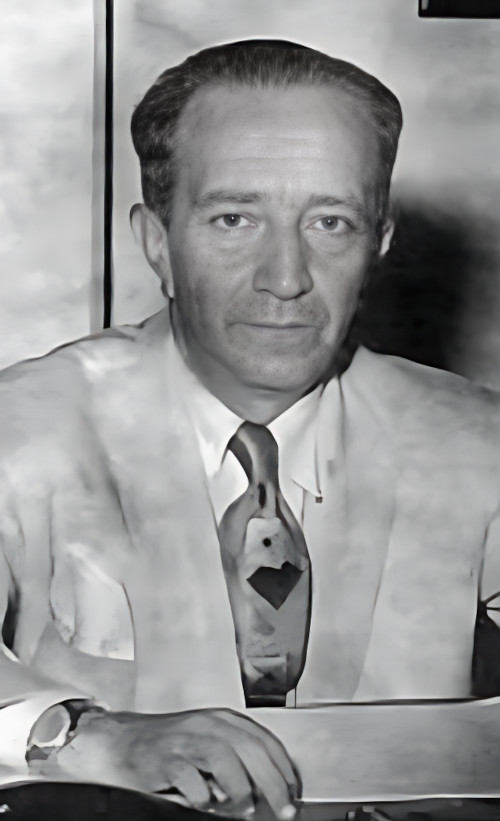Humberto Salvador Guerra (Guayaquil, December 25, 1909 – Ibidem, January 17, 1982) was an Ecuadorian writer, editor, jurist, psychoanalyst, and literature professor. His early literary works associated him with the avant-garde movement in Ecuador, publishing notable works such as the novel “En la ciudad he perdido una novela…” (1930). However, he shifted towards social realism in his later works, with novels such as “Camarada” (1933), “Trabajadores” (1935) and “Noviembre” (1939). Known for his exploration of human psychology and his bold examination of societal issues, Salvador’s works displayed a remarkable depth of insight and a willingness to challenge traditional norms. His remarkable literary legacy includes 13 novels, 4 short story collections, 2 plays, and a groundbreaking doctoral thesis titled “Esquema sexual” that has gone though many editions.
Early Life
Humberto Salvador Guerra, a distinguished Ecuadorian writer, was born on December 25, 1909, in Guayaquil, Guayas province. Tragically, he lost his parents at a young age and moved to live with a maternal aunt in Quito. It was during his formative years that Salvador’s passion for literature and social justice began to take shape.
Education and Literary Career
Salvador pursued his secondary education at the Instituto Nacional Mejía, where he became classmates with renowned writer Jorge Icaza. He then embarked on a journey of higher education at the Universidad Central del Ecuador, studying law while working as a literature professor at Mejía. His early writings appeared in various publications, including América, Llamarada, and El Día, serving as the editor-in-chief of the latter for several years.
Salvador’s literary career commenced with his involvement in the avant-garde movement in Ecuador. Alongside Pablo Palacio, he became a representative of this movement and published notable works, such as “En la ciudad he perdido una novela…” in 1930. The novel gained recognition over time and is now regarded as one of Salvador’s most remarkable pieces. Salvador also delved into the realm of short stories, with notable collections like “Ajedrez” (1929) and “Taza de té” (1930), which reflected his fascination with Freudian theories and explored characters with psychiatric and sexual obsessions.
Shift to Realism and Impact
In 1933, Humberto Salvador embraced a shift toward realism and naturalism, as exemplified by his critically acclaimed novel “Camarada.” This work marked a turning point in his career and garnered international recognition. He continued to produce notable novels, including “Trabajadores” (1935) and “Noviembre” (1939), with the latter stirring controversy for its portrayal of the dictatorship of Federico Páez. Salvador’s novels captured the essence of social issues, offering readers a deep insight into Ecuadorian society.
Exploring Human Psychology and Sexuality
Humberto Salvador’s intellectual curiosity led him to become a devoted follower and disseminator of Sigmund Freud’s ideas. His doctoral thesis, “Esquema sexual” (1933), became known as the “evangelio del freudismo ecuatoriano” (the gospel of Ecuadorian Freudism). In this groundbreaking work, Salvador challenged the criminalization of homosexuality in Ecuador, providing a clinical and scientific perspective to argue against its classification as a crime. He astutely observed the psychological contradictions of those who vehemently condemned sexual deviations, suggesting a hidden personal connection to such desires.
Being Rediscovered
Humberto Salvador has unfortunately been largely forgotten over the years. However, there have been commendable efforts in recent times to revive his work and reintroduce him to contemporary audiences. Notably, the editorial Escalera (Spain) spearheaded the revival of his novel “En la ciudad he perdido una novela…” on the occasion of his centenary in 2009. The editors, Talía Luis Casado and Daniel Ortiz Peñate, were initially focused on the writings of Pablo Palacio but were introduced to Salvador by Ecuadorian literary critic Wilfrido Corral. The novel’s non-linear narrative structure, its reflection on Quito, and its meta-literary experimentation captivated the editors, leading them to regard it as one of the best novels about the novel. Corral asserts that “En la ciudad he perdido una novela…” predates notable works like Leopoldo Marechal’s “Adán Buenosayres,” Juan Emar’s “Umbral,” Julio Cortázar’s “Rayuela,” and even later works such as Roberto Bolaño’s “Los detectives salvajes.”
Death
Humberto Salvador passed away on January 17, 1982.
Works
Novels
- En la ciudad he perdido una novela… (1930)
- Camarada (1933)
- Trabajadores (1935)
- Noviembre (1939)
- La novela interrumpida (1942)
- Prometeo (1943)
- Universidad Central (1944)
- La fuente clara (1946)
- Silueta de una dama (1964)
- La elegía del recuerdo (1966)
- Viaje a lo desconocido (1967)
- La extraña fascinación (1970)
- La ráfaga de angustia (1971)
Short Stories
- Ajedrez (1929)
- Taza de té (1930)
- La lírica resurrección (1967)
- Sacrificio (1978)
Theater
- Canciones de rosas (1925)
- Amor prohibido (1925)
Essay
- Esquema sexual (1933)

